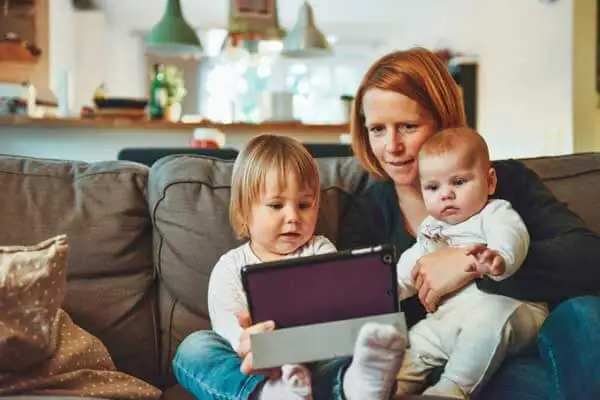
The ongoing COVID-19 pandemic is impacting all our lives in unexpected and challenging ways. Social distancing is making it harder for us to spend time with our loved ones nearby, while many are concerned for family and friends living and working abroad. We are all struggling with the challenges we face to stay as connected as we’re used to, or to help provide support and comfort to others when being there just isn’t possible.
Even during normal times, there’s lots of research showing how important maintaining social connections can be for our mental wellbeing and to help us manage stress. Connecting with others helps us feel less lonely and create more opportunities for fun and rewarding experiences. Being a mutual support gives us something we can control during uncertain times to positively affect the lives of our loved ones. It may also motivate us to keep up self-care habits and is a good way to disconnect from all the worrisome news out there. All of this can go together to improve the emotional and physical wellbeing of you and your social circle.
Some people have already found new and unique ways to work with others online to gather and celebrate milestones that COVID-19 has prevented. While these heartwarming and creative examples inspire us to find more ways to bridge that same distance in our lives, making it happen will take some work, planning, and probably a little trial-and-error.
Start by helping loved ones find and build comfort with new tools
Many of us have been using technology for years as a convenient way to stay updated and connected on social media and video-calling platforms. During this pandemic, web-services and software companies have enabled many businesses and services to help members of their community receive important goods and services while social distancing. However, the complexity of finding and setting up these apps, services, and accounts make it more difficult for loved ones to get started.
You can always let family and friends know about a helpful grocery delivery service nearby, but guiding them through setting up an account and starting a small cart with essentials will likely make them more comfortable with the process and continue the practice moving forward. Same thing goes for setting up group video calls and streaming services. Many devices allow you to record your screen so you can send a video clip to help with troubleshooting. Also, setting up scheduled calls and emailing invites ahead of time makes connecting more convenient for regular meet-ups.
Care for yourself to be the best support to others
Whether we are concerned about headlines and footage we see on the news, or reeling from how the pandemic has already started to affect the lives of our friends and family, we’ll need to work on coping as best we can ourselves to be in the best position to support our loved ones. This is especially important as they may be taking cues from you about how they should be feeling or reacting during these uncertain times.
Practicing good self-care and keeping a routine right now probably includes checking in with loved ones by phone of video-call at certain points of the day. Try to be mindful of your media diet during the day, and perhaps distance yourself from potentially unsettling news sources before you go to check-in. If that time could be spent on something recreational or relaxing, you might also have a rewarding or fun experience to share with your loved ones after. That might be a welcome distraction for them if it turns out they’ve had a hard time pulling themselves away from all this too.

Take time, if possible, to share some fun
Speaking of which, another way to help keep check-ins with our loved ones upbeat is to share an enjoyable activity together, and discuss new or creative ways to plan future digital gatherings. With some creativity and technical setup, we can still enjoy sharing experiences digitally. Several video-calling platforms can allow groups to gather to enjoy watching movies together, or while playing certain card and board games. Here’s another article that has several suggestions appropriate for families with children of different ages. Many museums, galleries, and other public places that have closed are offering virtual tours that can be accessed and shared on screen with others. Some services have even reduced or suspended subscription service fees during the pandemic to let families and friends do things they may have enjoyed while at home (e.g., Karaoke). For some, it may be enough to share quality time and daily rituals, like tea-time or reading stories at bedtime, that they may be missing out on right now.
It can also be an opportunity for family members to learn more about each other’s interests as we find new ways (and more time) to share them. For example, building and sharing playlists of your favourite music or some audiobooks you’ve enjoyed lately. Several musicians and artists have streamed and uploaded impromptu concerts from their home studios that can be watched back. We’ll likely have more time to dig into our own backlog to help with this, and we’re more likely to find and enjoy new things on the recommendation of a family member or friend.
Try to keep yourself (and others!) productive and share progress
Aside from planning activities together, connecting with loved ones by distance can still give us an opportunity to share what else we’re doing to keep busy during the pandemic. Even during normal times, it’s helpful to share our goals with others because we know it can help us stay accountable to keeping those goals over time. This can help us stay encouraged because we can share small improvements with people who know and care about our successes, or they may even think of a way they could participate or share in the process.
Sharing about our plans while time social distancing can always be done by chat or video-calling, but there are also some creative ways to share your progress and involve others from a distance. For example, scheduling a small recital among friends for a new piece of music or a small exhibition for arts and crafts the kids are making can provide a rewarding way to structure some of that free time and get others involved too. It can be fun for any age group, like a Mandala or an animal drawing together that each person can colour themselves to share and compare next time.
These are just some of the things to think about when trying to stay connected while maintaining your distance. Not every activity will appeal to you, not everything translates as well to going digital, and it probably won’t feel quite like being there. But by taking the time and effort to bridge the gap we can remind our loved ones they aren’t alone through these difficult times. With any luck, they’ll be inspired to suggest activities for future gatherings and share some of their own interests too.
Find your way
Our clinicians provide safe, compassionate support to help people manage mental health challenges using evidence based approaches including CBT, DBT, and ACT.
